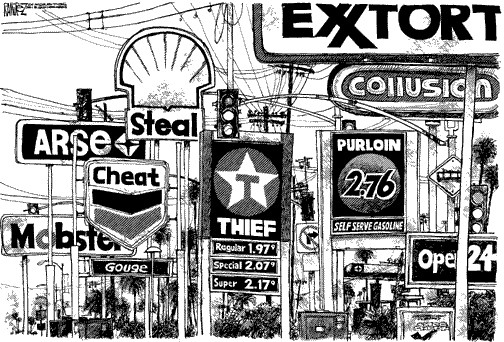
Regulators claim firm attempted to 'bang the close' by amassing large positions just before markets closed.
http://money.cnn.com/2008/07/24/mar...=rss_topstories
7/24/2008
NEW YORK (CNNMoney.com) -- The government charged an oil trading firm Thursday with manipulating oil prices in the first complaint to be announced since the regulators began a new investigation into wrongdoings in the energy markets.
The Commodity Futures Trading Commission accused Optiver Holding, two of its subsidiaries and three employees with manipulation and attempted manipulation of crude oil, heating oil and gasoline futures on the New York Mercantile Exchange.
"Optiver traders amassed large trading positions, then conducted trades in such a way to bully and hammer the markets," CFTC Acting Chairman Walt Lukken said at a press conference. "These charges go to the heart of the CFTC's core mission of detecting and rooting out illegal manipulation of the markets."
In May, under the backdrop of record oil prices and calls from legislators to crack down on speculative oil trading and market manipulation, the CFTC announced a wide-ranging probe into oil price manipulation. The agency says it has dozens of investigations ongoing.
The complaint filed Thursday names Bastiaan van Kempen, chief executive; Christopher Dowson, a head trader; and Randal Meijer, head of trading at an Optiver subsidiary.
The CFTC said the firm attempted to "bang the close" by amassing large positions just before markets closed - forcing prices up - then selling them quickly to drive prices down and pocketing the difference.
The alleged manipulation was attempted 19 times on 11 days in March 2007, the agency said. In at least five of those 19 times, traders succeeded in driving prices higher twice and lower three times, according to the CFTC.
Calls to Optiver seeking comment were not answered, and an email was not immediately returned.
CFTC stressed that the price changes were small and the manipulation was isolated, and that the investigation has nothing to do with the recent heat the agency has taken on Capitol Hill over rising oil prices.
Traders in the spotlight
CFTC has repeatedly said that speculators are not to blame for rising oil prices, and any cases of price manipulation - such as the one brought Thursday - have only a small, if any, effect on oil prices.
The CFTC is the government's main regulator of commodity markets. Its officials have been hauled before Congress and asked repeatedly whether manipulation or excessive speculation is playing a role in record oil prices.
Repeatedly, CFTC experts have said they have found no evidence that speculators - investors who do not ultimately use crude oil - are to blame for the rising prices. They say trading information shows no correlation between investment activity and price swings.
Others, such as the International Energy Agency, have also said speculators are not to blame. They've pointed to other non-traded commodities that have risen in price even faster than oil, and to the fact that there is no evidence of a bubble, such as excess oil sitting around in storage.
Still, the correlation of a four-fold increase of investment money into oil futures and a four-fold increase in oil prices since 2004 has not gone unnoticed. Many lawmakers, consumer rights advocates and even some oil industry analysts say speculation is at least partly to blame.
Against that backdrop, the CFTC has been ordered to investigate the matter more thoroughly and dozens of investigations are underway. The agency may soon be given a bigger staff and wider powers under bills being debated in Congress.
Over the years, the CFTC has found isolated incidents of price manipulation - when an oil producer controls products to influence prices - or other cases of wrongdoing. Since 2002, the agency has charged 66 defendants with energy market violations.
In a recent case, BP settled a suit that alleged the company tried to corner the propane market to inflate prices in 2003 and 2004. BP agreed to pay a $303 million settlement.
But overall, most experts say the incidents are so scattered, and the energy market so large, that it's unlikely a single trader or group of traders can have substantial sway over prices.
Correction: An earlier version of the story said indictments have been brought against the company and some of its employees. The charges are civil, not criminal.




No comments:
Post a Comment